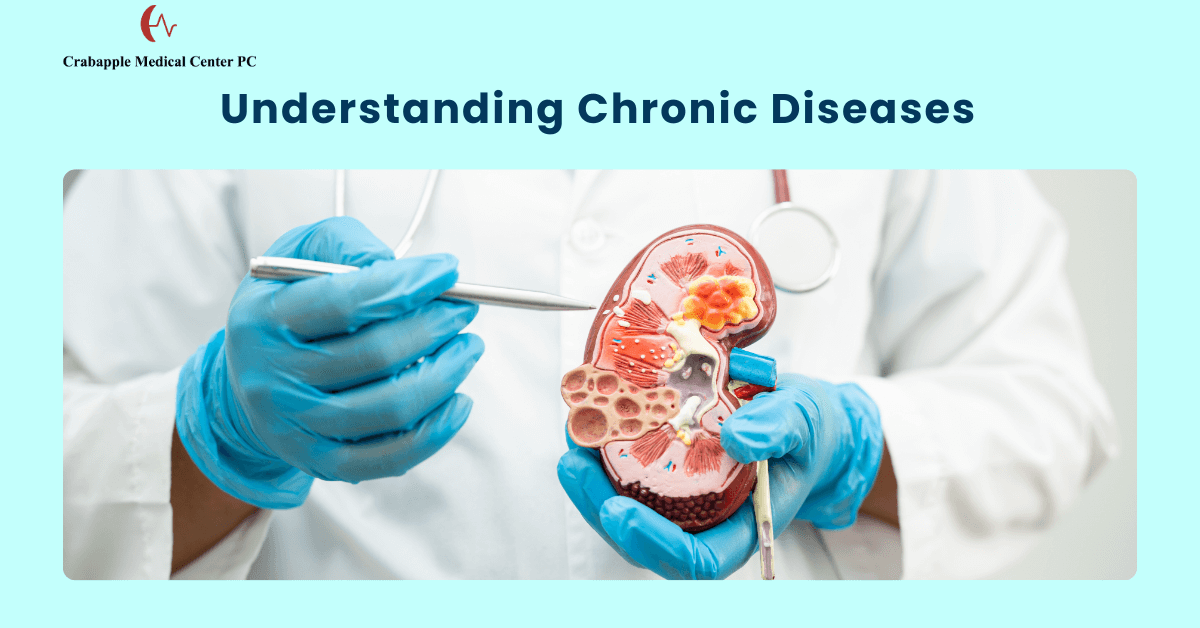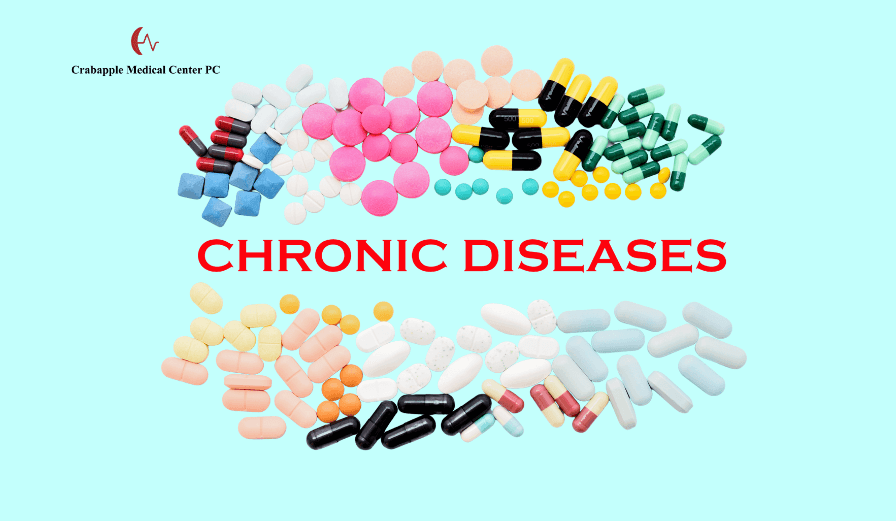Chronic diseases such as diabetes, hypertension, and asthma affect millions of people in the United States and around the world. These conditions, if left unmanaged, can lead to serious complications including heart disease, stroke, kidney damage, respiratory failure, and a reduced quality of life. They also contribute significantly to healthcare costs and can create ongoing emotional and physical burdens for patients and their families.
At Crab Apple Medical Center in Alpharetta, GA, we understand that managing chronic disease can feel overwhelming. That’s why our team provides personalized care, ongoing education, and compassionate support. We aim to empower our patients with the knowledge and tools they need to take control of their health and prevent complications.
This comprehensive guide will help you understand each of these conditions, recognize symptoms early, implement practical management strategies, adopt lifestyle interventions, and learn how Crab Apple Medical Center can support you every step of the way.

Understanding Chronic Diseases
Chronic diseases are long-term medical conditions that typically require continuous management to prevent worsening symptoms or complications. They often develop gradually, and many people may not notice the early signs. This makes early recognition, consistent monitoring, and lifestyle management critical.
Some of the most common chronic conditions include:
- Diabetes: A metabolic disorder affecting how the body regulates blood sugar, leading to potential organ damage if uncontrolled.
- Hypertension: Commonly called high blood pressure, which puts stress on the heart, arteries, kidneys, and brain.
- Asthma: A respiratory condition where the airways become inflamed and narrowed, causing difficulty breathing.
Although each condition affects the body differently, they share common management strategies:
- Medication adherence
- Lifestyle modifications including diet and exercise
- Regular monitoring of symptoms and vital signs
- Ongoing patient education and support
Effective management can prevent serious complications, improve quality of life, and allow patients to remain active and independent.
Diabetes: Causes, Symptoms & Management

What is Diabetes?
Diabetes is a chronic condition in which the body struggles to properly process glucose, resulting in high blood sugar levels. Over time, uncontrolled diabetes can damage organs, nerves, and blood vessels.
There are two main types of diabetes:
Type 1 Diabetes
An autoimmune condition in which the body does not produce insulin, a hormone essential for regulating blood sugar. Type 1 diabetes often develops in childhood or adolescence but can occur in adults.
Type 2 Diabetes
The body does not use insulin effectively, a condition known as insulin resistance. The pancreas may eventually fail to produce enough insulin. Type 2 diabetes is often associated with lifestyle factors, genetics, and age, and it is the most common form of diabetes.
Common Symptoms of Diabetes
Recognizing early symptoms is vital for prompt diagnosis and management. Common warning signs include:
- Frequent urination, especially at night
- Excessive thirst and dehydration
- Unexplained weight changes, either gain or loss
- Fatigue and low energy levels
- Blurred vision
- Slow-healing cuts, bruises, or infections
If you notice these symptoms, early medical evaluation at Crab Apple Medical Center can prevent complications and help you take control of your health.
Diabetes Management Strategies
Managing diabetes effectively requires a combination of medical treatment, lifestyle changes, and regular monitoring. Key strategies include:
Monitoring blood glucose
Regular home or clinic testing helps maintain blood sugar within target ranges and informs treatment decisions.
Medication adherence
Taking insulin or oral diabetes medications as prescribed is crucial for preventing complications.

Healthy diet
Emphasize whole grains, lean proteins, fruits, vegetables, and controlled carbohydrate intake. Avoid processed foods and added sugars.
Physical activity
Regular exercise improves insulin sensitivity, helps manage weight, and supports heart and bone health.
Regular check-ups
Monitor for complications affecting the kidneys, eyes, nerves, and cardiovascular system. Early detection of changes allows for timely intervention.
Prevention Tips for Diabetes
- Maintain a healthy weight: Even modest weight loss can reduce the risk of type 2 diabetes.
- Balanced diet: Emphasize vegetables, whole grains, lean proteins, and healthy fats. Limit added sugars and refined carbs.
- Regular physical activity: Aim for at least 150 minutes of moderate exercise per week.
- Avoid tobacco and excessive alcohol: These can worsen insulin resistance and increase complications.
- Routine screenings: Annual A1C and fasting blood sugar tests for those at risk.
Diabetes Monitoring Strategies
- Daily or regular glucose checks: For diabetics, self-monitoring helps keep blood sugar within target range.
- Regular lab tests: A1C every 3–6 months, kidney function, cholesterol, and eye exams.
- Medication adherence: Take insulin or oral medications as prescribed and review dosages with your provider.
- Symptom tracking: Note episodes of high/low blood sugar, fatigue, blurred vision, or unusual thirst.
Hypertension: Understanding High Blood Pressure

What is Hypertension?
Hypertension, commonly known as high blood pressure, occurs when the force of blood against the walls of your arteries is consistently too high. Over time, this added pressure can damage your heart, blood vessels, kidneys, and other organs. Often called the “silent killer,” hypertension may not produce noticeable symptoms until serious complications arise, making regular monitoring and preventive care essential.
Crab Apple Medical Center in Alpharetta, GA, emphasizes early detection and ongoing management to help patients maintain normal blood pressure and reduce the risk of heart disease, stroke, and kidney problems.
Common Symptoms
Many people with hypertension do not experience symptoms, which is why it is crucial to check blood pressure regularly. In some cases, signs may include:
- Headaches or migraines
- Shortness of breath
- Nosebleeds
- Chest discomfort or palpitations
- Dizziness or fatigue
Even if you feel fine, persistent high blood pressure can silently damage your organs, highlighting the importance of routine screenings.
Causes and Risk Factors
Hypertension often develops gradually and can be influenced by multiple factors, including:
- Genetics and family history of high blood pressure
- Age (risk increases with age)
- Sedentary lifestyle
- Poor dietary habits, especially high sodium intake
- Obesity or overweight
- Excessive alcohol consumption or smoking
- Chronic stress
Understanding your risk factors allows your healthcare provider to tailor a personalized plan to prevent complications.
Management Strategies of Hypertension
Managing hypertension requires a comprehensive approach combining medical care, lifestyle changes, and ongoing monitoring:
- Home blood pressure monitoring: Tracking readings at home helps detect daily fluctuations and evaluate the effectiveness of treatment.
- Medications: Common options include ACE inhibitors, beta-blockers, calcium channel blockers, and diuretics. Adherence to prescribed medications is critical.
- Heart-healthy diet: Emphasize fruits, vegetables, whole grains, lean proteins, and low-fat dairy. Reduce sodium and avoid processed foods.
- Regular exercise: Moderate aerobic activity, strength training, and flexibility exercises help control blood pressure and improve cardiovascular health.

- Stress management: Yoga, meditation, deep breathing, and adequate sleep can reduce stress-induced blood pressure spikes.
- Avoid tobacco and limit alcohol: Both substances increase the risk of heart disease and worsen hypertension.
Prevention Tips for Hypertension
- Heart-healthy diet: Focus on fruits, vegetables, whole grains, lean proteins, and low-fat dairy. Reduce sodium intake.
- Maintain a healthy weight: Weight management reduces blood pressure and cardiovascular risk.
- Exercise regularly: Aerobic activities, strength training, and flexibility exercises help control blood pressure.
- Limit alcohol and avoid smoking: Both contribute to elevated blood pressure and heart disease.
- Stress management: Techniques like yoga, meditation, and deep breathing support healthy blood pressure.
Hypertension Monitoring Strategies
- Home blood pressure checks: Helps detect daily fluctuations and identify patterns.
- Regular clinic visits: Blood pressure measurement, lab tests for kidney function, and cardiovascular assessments.
- Medication review: Adjustments to antihypertensive drugs as needed for optimal control.
- Track symptoms: Headaches, dizziness, chest discomfort, or shortness of breath may indicate the need for urgent care.
Asthma: Understanding and Managing Chronic Respiratory Health

What is Asthma?
Asthma is a chronic condition in which the airways in the lungs become inflamed and narrowed, making breathing difficult. This inflammation can lead to recurrent episodes of wheezing, shortness of breath, chest tightness, and coughing. Symptoms can range from mild to severe and may flare up in response to triggers.
Asthma is a lifelong condition that can significantly impact daily life if not properly managed. At Crab Apple Medical Center in Alpharetta, GA, we help patients recognize early warning signs, identify triggers, and develop personalized asthma management plans to reduce flare-ups and improve lung function.
Common Symptoms
Asthma symptoms can vary in frequency and intensity but often include:
- Wheezing, especially during exhalation
- Shortness of breath or rapid breathing
- Chest tightness or pressure
- Persistent coughing, particularly at night or early morning
- Difficulty performing physical activities due to breathlessness
Recognizing these symptoms early allows for prompt intervention and reduces the risk of severe asthma attacks.
Causes and Triggers of Asthma
Asthma can be triggered by a variety of factors, and identifying these triggers is key to effective management:
- Allergens: Dust mites, pollen, mold, pet dander
- Respiratory infections: Cold, flu, or sinus infections
- Environmental irritants: Tobacco smoke, air pollution, strong odors
- Exercise-induced: Physical activity can provoke symptoms in some patients
- Weather changes: Cold air, humidity, or sudden temperature shifts
- Stress or strong emotions: Emotional stress may trigger airway constriction
Each patient may have a unique combination of triggers, which is why personalized assessments at Crab Apple Medical Center are essential for effective asthma care.
Management Strategies for Asthma
Effective asthma management requires a combination of medical treatment, lifestyle adjustments, and ongoing monitoring:
- Medication adherence:
- Rescue inhalers: For sudden asthma attacks.
- Controller medications: Daily inhalers reduce inflammation and prevent flare-ups.
- Trigger avoidance: Identify personal triggers and minimize exposure when possible.
- Regular monitoring: Track symptoms and use tools like peak flow meters to measure lung function.
- Asthma action plan: Personalized guidance on medication use, identifying warning signs, and steps to take during an exacerbation.
- Vaccinations: Annual flu shots and COVID-19 vaccines help reduce infection-related flare-ups.
At Crab Apple Medical Center, our team provides pulmonary assessments, inhaler technique training, asthma education, and follow-up care to ensure patients maintain optimal respiratory health.
Prevention Tips for Asthma
- Identify and avoid triggers: Common triggers include pollen, dust, smoke, mold, pet dander, cold air, or exercise-induced triggers.
- Vaccinations: Annual flu shots and COVID-19 vaccinations reduce risk of respiratory infections that can worsen asthma.
- Healthy lifestyle: Regular physical activity, balanced diet, and maintaining a healthy weight improve lung function.
- Proper inhaler technique: Ensures medication reaches the lungs effectively.
Asthma Monitoring Strategies
- Peak flow monitoring: Measures lung function at home and helps detect early signs of flare-ups.
- Symptom tracking: Record frequency and severity of wheezing, coughing, or chest tightness.
- Regular check-ups: Pulmonary function tests, medication adjustments, and asthma action plan updates.
- Emergency plan: Know when to use rescue inhalers and when to seek immediate care.
Comprehensive Chronic Disease Treatment
Manage your diabetes, hypertension, or asthma with expert care from Crab Apple Medical Center. Our team offers personalized treatment plans, medication management, and ongoing support to help you live healthier and prevent complications.
Lifestyle Interventions and Patient Support
Managing chronic diseases like diabetes, hypertension, and asthma goes beyond medication. Lifestyle interventions play a crucial role in controlling symptoms, preventing complications, and improving overall quality of life. At Crab Apple Medical Center in Alpharetta, GA, we emphasize a holistic approach that combines medical care with lifestyle education and ongoing patient support.
Nutrition and Diet
Healthy eating is a cornerstone for managing chronic diseases:
- Diabetes: Focus on controlling blood sugar with complex carbohydrates, fiber-rich foods, lean proteins, and healthy fats. Limit sugary beverages and processed snacks.
- Hypertension: Emphasize a low-sodium diet rich in potassium, magnesium, and calcium to support blood pressure regulation. Include fruits, vegetables, whole grains, and lean proteins.
- Asthma: Anti-inflammatory foods, such as omega-3 rich fish, leafy greens, and colorful fruits, may help reduce airway inflammation. Avoid foods that trigger allergic reactions.
Physical Activity
Regular exercise strengthens the body, supports cardiovascular health, and enhances lung function:
- Aerobic exercises: Walking, swimming, or cycling improve heart and lung health and support weight management.
- Strength training: Helps maintain muscle mass, supports metabolism, and stabilizes blood sugar.
- Flexibility and balance exercises: Yoga or stretching improve mobility and reduce stress.
Patients with asthma should work with their providers to identify safe exercise routines that minimize triggers while maintaining fitness.
Stress Management
Chronic stress can exacerbate symptoms of chronic diseases, including raising blood pressure, affecting blood sugar, and triggering asthma attacks. Effective stress management techniques include:
- Mindfulness meditation and deep breathing exercises
- Journaling and reflective practices
- Regular physical activity and outdoor time
- Social engagement and community support
- Seeking professional counseling when needed
Sleep and Rest
Quality sleep is essential for chronic disease management:
- Insufficient sleep increases insulin resistance, elevates blood pressure, and triggers inflammation.
- Adults should aim for 7–9 hours of restorative sleep each night.
- Establish a consistent sleep routine, minimize screen time before bed, and create a calm sleep environment.
Monitoring and Self-Care
Empowering patients with self-monitoring tools and education improves outcomes:
- Diabetes: Home glucose monitoring, keeping a log of readings, and tracking meals and activity.
- Hypertension: Daily or weekly blood pressure checks to detect trends early.
- Asthma: Symptom diaries, peak flow readings, and inhaler usage logs.
Education on recognizing warning signs and knowing when to seek medical attention is vital. Crab Apple Medical Center provides patients with personalized guidance.
Patient Support and Follow-Up
Chronic disease management is most effective with continuous support:
- Regular follow-up appointments to assess treatment effectiveness
- Medication adjustments as needed
- Coordination with specialists such as endocrinologists, cardiologists, or pulmonologists
- Access to educational resources, workshops, and support groups in Alpharetta, GA
At Crab Apple Medical Center, we ensure that patients feel supported every step of the way, creating a collaborative approach to long-term health and wellness.
Integrated Approach to Chronic Disease Management
For patients with more than one chronic condition, an integrated monitoring strategy is key:
- Combined check-ups: Coordinate diabetes, hypertension, and asthma monitoring in one visit.
- Lifestyle synergy: Exercise, diet, stress reduction, and sleep management benefit multiple conditions simultaneously.
- Patient education: Empower patients to understand readings, recognize warning signs, and adhere to care plans.
- Technology support: Use apps, reminders, and digital health tools for tracking symptoms, medications, and appointments.
How Crab Apple Medical Center Supports Chronic Disease Management?
- Comprehensive screenings: Identify risk factors early through lab tests, blood pressure checks, and pulmonary assessments.
- Personalized care plans: Customized plans for lifestyle changes, medications, and follow-up visits.
- Education and coaching: Guidance on nutrition, exercise, stress management, and adherence to therapy.
- Specialist coordination: Referrals to endocrinologists, cardiologists, pulmonologists, or nutritionists when needed.
- Ongoing follow-up: Monitor your progress and adjust plans to optimize long-term health outcomes.
When to Seek Help
Seek medical attention if:
- Blood sugar or blood pressure readings are consistently outside the target range.
- You experience worsening asthma symptoms or frequent flare-ups.
- You notice complications such as swelling, vision changes, or chest discomfort.
- You feel overwhelmed managing your condition alone.
Early intervention prevents complications and improves quality of life.
Prevention, Monitoring, and Support for You
Chronic diseases like diabetes, hypertension, and asthma may be lifelong conditions, but they do not have to define your life. With early recognition, consistent monitoring, healthy lifestyle choices, and personalized medical care, you can manage symptoms, prevent complications, and enjoy a full, active life.
At Crab Apple Medical Center in Alpharetta, GA, our team is dedicated to supporting you every step of the way with expert guidance, patient education, and compassionate care. Don’t wait for symptoms to worsen—take charge of your health today and invest in a healthier tomorrow.
Take Charge of Your Health
Managing chronic diseases requires a combination of professional care, lifestyle changes, and patient education. At Crab Apple Medical Center in Alpharetta, GA, we are dedicated to empowering you with the tools, guidance, and support to live a healthier, longer life.
Frequently Asked Questions
What is considered a chronic disease?
Chronic diseases are long-term conditions that require ongoing management, such as diabetes, hypertension, and asthma. They often develop gradually and may not show symptoms initially.
How can I prevent complications from diabetes or hypertension?
Prevention includes regular monitoring, adherence to prescribed medications, a balanced diet, regular exercise, stress management, avoiding smoking, and routine medical check-ups.
Can lifestyle changes really improve chronic conditions?
Yes, lifestyle changes such as healthy eating, consistent physical activity, stress reduction, and adequate sleep can significantly improve blood sugar, blood pressure, and respiratory health.
How often should I have check-ups for chronic diseases?
Check-ups vary depending on your condition, but generally, patients should have regular follow-ups every 3–6 months, with more frequent visits if symptoms are uncontrolled.
Are there specific warning signs I should watch for?
Yes. For diabetes, watch for frequent urination, excessive thirst, or fatigue. For hypertension, monitor headaches, dizziness, or chest discomfort. For asthma, watch for wheezing, shortness of breath, or persistent coughing.

